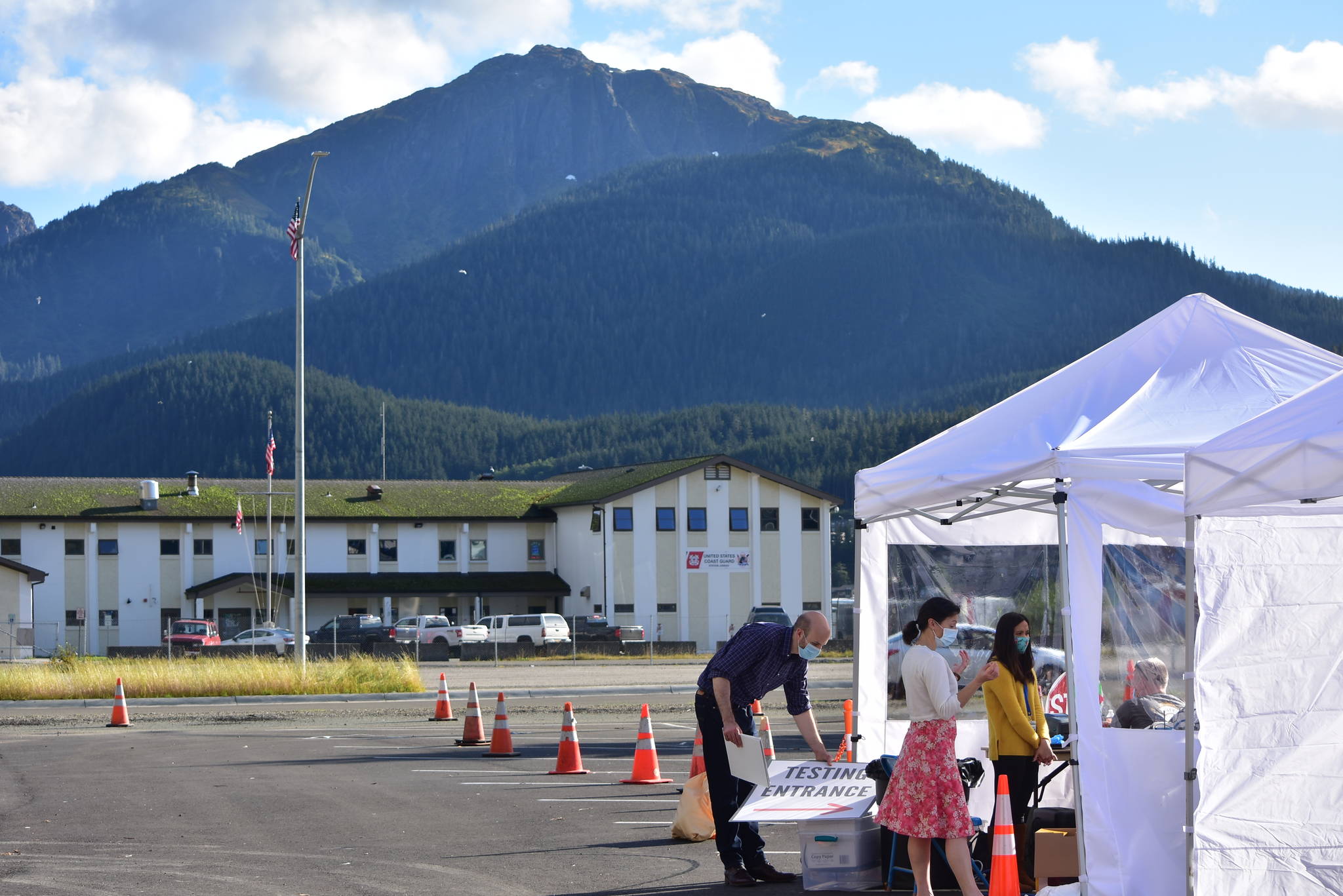Juneau officials are waiting on test results for the more than 700 tests administered in the city over a period of time dating back to last week as local health officials try to get a handle on an outbreak of COVID-19. The city put out a notice last week recommending anyone who socialized at a bar between late August and early September get tested even if they weren’t showing symptoms.
That led to a deluge of calls to the city’s COVID-19 hotline and the decision by the City and Borough of Juneau to set up an additional drive-thru testing site in the parking lot of Centennial Hall starting last Thursday to accommodate the high volume of requests.
The first were expected to arrive Monday afternoon, said Robert Barr, planning section chief for the city’s Emergency Operations Center.
The city’s emergency operations center reported Monday evening nine new COVID-19 cases among residents since Friday afternoon. Seven of the cases came in Friday evening and two over the weekend, according to the city. Public Health attributes six of the cases to community spread. Of those six cases, four are associated with bar activity, according to the city. One of the nine cases is attributed to close contact with a known case and two cases are under investigation.
There have now been 25 cases from the past few weeks linked to a social gathering held near the end of August, according to the city.
The state reported 77 new cases Monday, with 4,849 active cases. The state’s average case rate, based on percent positive per 100,000 people over 14 days, was trending upward over the weekend state data show. The state’s average for Sunday was 10.41, a high alert level under the state’s risk metric system. For Juneau, state data show the city’s 14-day average at 14.29 as of Sunday, part of an upward trend in Juneau’s average which began Sept. 2.
Asked if the state laboratories were prioritizing Juneau’s tests, Barr said he had been in contact with state health officials earlier who said they will do everything they can.
The city’s community alert level for coronavirus was raised to Level 3 High, Friday night, a designation with built-in mitigation strategies which shut down bars to indoor service and limited restaurants to 50% capacity for reservation only, dine-in service. City officials are hoping mitigation efforts will ultimately lead to a decrease in the spread of the disease and a reduction in the city’s alert level, Barr said. The state’s alert levels give only recommendations for the general public, with no increased regulations.
[Juneau’s testing machine unlikely to come before December. Here’s why]
“Our hope is that everyone who needed it got tested, a number of bars have been closed for approaching two weeks now,” Barr said. “Our hope is that by going to Level 3 and having bars close and having this large scale testing effort, we’ll turn the corner here and be able to go in the opposite direction.”
Juneau uses a number several metrics to assess its risk level, and it was the measurement of the “containment situation” that caused the most concern for city officials, Barr said. While the number of cases is rising and there is community spread, there are only three patients currently at the hospital with the coronavirus, according to city data, and Barr said the city’s overall health care capacity remained in good standing.
Setting up extra testing sites was an enormous effort and required the coordination and contribution between several city departments, Barr said.
“I’ve gotten a lot of questions about ‘Why can’t we do this all the time?’” Barr said. “It would very quickly lead to burn out. A lot of people pulled together to make this happen, it wasn’t just CBJ. We had staff volunteer from (Bartlett Regional Hospital, Alaska Division of Public Health), we had staff from Docks and Harbors help with registration work. It was an all hands on deck situation.”
Barr said city officials had not ruled out setting up a drive-thru testing site again if the need arises, but emphasized the complexities of putting together a testing operation. Only trained medical personnel could administer the tests, Barr said, not because the testing itself was dangerous, but because of risks associated with removing personal protective equipment. Removing PPE is when most health care professionals contracted COVID-19, Barr said.
“The training requirement is donning and doffing PPE,” he said. “If you are a medical worker and contract the virus because of your job, generally, that happens when you’re taking off your PPE.”
Friday was the busiest day for the downtown test site, according to Barr, who said 283 people were tested. The city had a limited opening Thursday but was still able to test 77 people, he said, though numbers started to decline Saturday and Sunday, which respectively saw 168 and 150 tests administered.
City officials are awaiting test results to determine next steps, Barr said.
• Contact reporter Peter Segall at psegall@juneauempire.com. Follow him at @SegallJnuEmpire.

